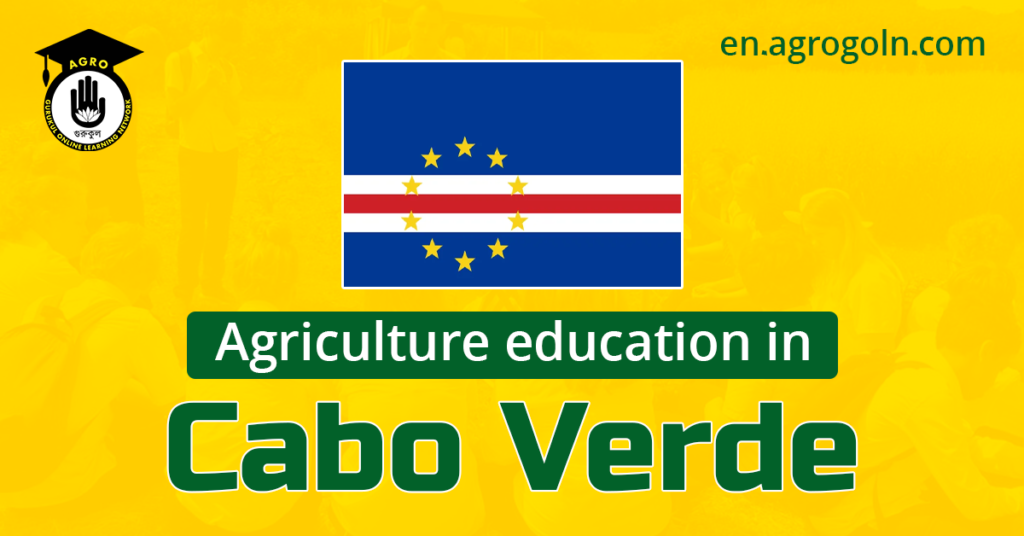Agriculture Education in Cabo Verde (Cape Verde): Driving Sustainable Growth through Knowledge and Skills. Cabo Verde, also known as Cape Verde, is a ten-island archipelago situated off the West African coast. This Atlantic Ocean nation, despite its size, holds a significant role in the African agricultural scene, particularly in areas of sustainability and climate resilience. Despite facing challenges due to its arid climate, limited natural resources, and susceptibility to climate change, the country has taken big strides in agriculture education to fortify its resilience and productivity. This article explores the landscape of agriculture education in Cabo Verde and its implications for the nation’s sustainable development.
Agriculture Education in Cabo Verde (Cape Verde): Driving Sustainable Growth through Knowledge and Skills
Agriculture in Cabo Verde is heavily influenced by the country’s unique geographical and climatic conditions. With its largely arid and semi-arid landscapes, farming is largely restricted to specific areas. Rain-fed agriculture is predominant, making it highly susceptible to the effects of climate change, notably erratic rainfall and droughts. This vulnerability has prompted the need for innovative agricultural practices, and by extension, robust education and training in the field of agriculture.
Agriculture Education in Cabo Verde
Cabo Verde’s agriculture education system spans several levels, starting from basic education through to higher education. It’s designed to equip the citizens with a good understanding of the country’s unique agricultural circumstances and the skills to navigate them effectively. This educational approach is essential in a country where nearly 10% of the population is directly engaged in agriculture, and a much larger portion depends on it indirectly.
-
Basic and Secondary Education
In Cabo Verde, agricultural education begins in basic and secondary schools where students are introduced to fundamental agricultural practices and concepts. This is a crucial step in raising awareness of the significance of agriculture and fostering an interest in agricultural careers from a young age.
Schools often incorporate practical activities such as school gardens to supplement the theoretical aspects of the curriculum. Students learn by doing, engaging in planting, weeding, harvesting, and even marketing the produce. These activities offer a comprehensive learning experience that emphasizes the connection between agriculture, nutrition, and the environment.
-
Vocational Training
Vocational training is a critical aspect of Cabo Verde’s agriculture education. Vocational schools and training centers, like the School of Agriculture and Environment (ESAE), offer specialized courses in agriculture and related fields. These courses are tailored to provide practical skills and knowledge in areas such as soil management, crop production, animal husbandry, irrigation techniques, and post-harvest management.
The curriculum incorporates elements of entrepreneurship and business management to equip the students with skills to start and manage their own agricultural businesses. This combination of practical skills and business acumen is crucial in driving agricultural innovation and improving food security in the country.
-
Higher Education
Higher education institutions like the University of Cabo Verde (Uni-CV) offer undergraduate and postgraduate programs in agricultural sciences. These programs delve deeper into various agricultural disciplines, with a significant emphasis on research. The research component is key in advancing agricultural knowledge and practices in the country, focusing on areas such as climate change adaptation, sustainable farming systems, agricultural economics, and agroecology.
Challenges and Opportunities in Agriculture Education
While Cabo Verde’s agriculture education system is making significant strides, challenges persist. Limited resources, both financial and human, pose constraints to the expansion and enhancement of agricultural education. The perception of agriculture as a less desirable career path, particularly among the youth, also hampers the sector’s growth.
However, these challenges also present opportunities. There is an increased need for collaborations and partnerships with international institutions to bolster resources for agricultural education. Moreover, concerted efforts to rebrand agriculture and showcase its potential as a viable and sustainable career path could entice more young people into the field.
The Future of Agriculture Education in Cabo Verde
As Cabo Verde continues to grapple with the effects of climate change, the importance of agricultural education in shaping a resilient and productive agricultural sector cannot be overstated. The future of agriculture education in Cabo Verde lies in its ability to adapt to the changing agricultural landscape. This adaptation involves embracing digital technologies, encouraging research and innovation, promoting agroecology, and fostering an entrepreneurial mindset among the students.
Digital technologies, such as e-learning platforms, can expand access to agricultural education, especially in remote areas. Agroecology, the application of ecological principles to agriculture, promises a sustainable approach to farming that could increase productivity while preserving the environment.
Meanwhile, encouraging research and innovation in agriculture can lead to the development of new technologies and farming practices that can withstand Cabo Verde’s harsh climatic conditions. Finally, fostering an entrepreneurial mindset can lead to the creation of agricultural startups, promoting job creation and economic growth.
Conclusion
Cabo Verde, despite its geographical and climatic challenges, is making laudable strides in agricultural education. The country understands the importance of this education in securing its food future and strengthening its resilience to climate change. Through a comprehensive educational system, from basic to higher education, Cabo Verde is gradually building an agricultural sector that is resilient, innovative, and capable of driving sustainable development. The country’s efforts offer valuable insights for other nations seeking to strengthen their own agricultural sectors through education.
See more:

